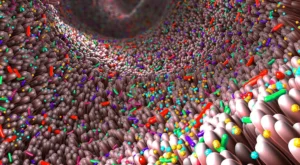By Ross Pelton, RPh, PhD, CCN
There is increasing evidence that exercise improves your microbiome. A recently published study with previously sedentary individuals (18 lean and 14 obese) reported that a 6-week exercise program substantially increased the number of healthy colonic bacteria in healthy sedentary people.i The participants engaged in a supervised exercise program (treadmill or cycling) 3 days/week that progressed from 30 to 60 minutes/day at intensity levels that progressed from moderate to vigorous.
Researchers collected fecal samples before and after six weeks of exercise, as well as after the sedentary washout period. At the conclusion of the 6-week exercise program, the lean individuals were found to have higher levels of probiotic bacteria in the colon that ferment dietary fiber into short-chain fatty acids (SCFAs), compared to the obese individuals. SCFAs are critically important postbiotic metabolites that are associated with the following benefits:
In addition to improving the composition and function of their microbiome, the participants also made the following gains:
- significant increase in their level of physical fitness (measured by VO2max which is the maximum ability to take in and utilize oxygen
- increase in muscle size
- reduction in body fat
At the conclusion of this study, participants returned to their previously sedentary life style. Interestingly, although they maintained their gains in physical fitness, the beneficial changes in their microbiome were largely reversed once their weekly exercise training ceased.
The authors of this study summarized their findings in the following statement; “These findings suggest that exercise training induces compositional and function changes in the human gut microbiota that are dependent on obesity status, independent of diet and contingent on the sustainment of exercise.”





